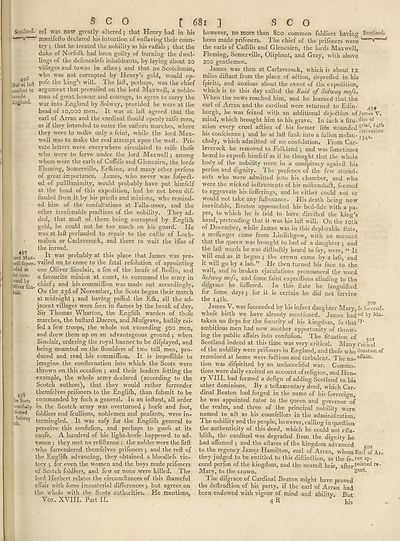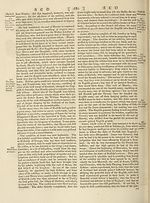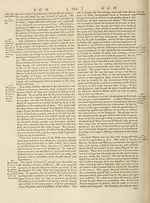Encyclopaedia Britannica, or, a Dictionary of arts, sciences, and miscellaneous literature : enlarged and improved. Illustrated with nearly six hundred engravings > Volume 18, RHI-SCR
(719) Page 681
Download files
Complete book:
Individual page:
Thumbnail gallery: Grid view | List view

invade
England,
SCO [6
Scotland, re! was now greatly altered; that Henry had in his
'—■’'V—manifefto declared his intention of enflaving their coun¬
try 5 that he treated the nobility as his vaffals ; that the
duke of Norfolk had been guilty of burning the dwel¬
lings of the defencelefs inhabitants, by laying about 20
villages and towns in alhes; and that no Scotchman,
who was not corrupted by Henry’s gold, would op-
!3ut at laft P°^e tlie king’5 will. The laft, perhaps, was the chief
content to argument that prevailed on the lord Maxwell, a noble¬
man of great honour and courage, to agree to carry the
war into England by Solway, provided he were at the
head of 10,000 men. It was at laft agreed that the
earl of Arran and the cardinal fhould openly raife men,
as if they intended to enter the eaftern marches, where
they were to make only a feint, while the lord Max¬
well was to make the real attempt upon the weft. Pri¬
vate letters were everywhere circulated to raife thofe
■who were to ferve under the lord Maxwell j among
whom were the earls of Caflllis and Glencairn, the lords
Fleming, Somerville, Erfkine, and many other perfons
of great importance. James, who never was fufpeft-
ed of pufillanimity, would probably have put himfelf
at the head of this expedition, had he not been dif-
fuaded from it by his priefts and minions, who remind¬
ed him of the confultations at Falla-moor, and the
other treafonable pra&ices of the nobility. They ad¬
ded, that moft of them being corrupted by Englilh
gold, he could not be too much on his guard.' He
was at laft perfuaded to repair to the caftle of Loch-
maben or Carlaverock, and there to wait the iffue of
the inroad.
It was probably at this place that James was pre-
vellfuper- vailed on to come to the fatal refolution of appointing
sded in one Oliver Sinclair, a fon of the houfe of Rollin, and
■land0™* a favour*te ro™011 at court, to command the army in
Miver Sin-chief > an^ his cornmifllon was made out accordingly,
lair. On the 23d of November, the Scots began their march
at midnight j and having paffed the Elk, all the ad¬
jacent villages were feen in flames by the break of day.
Sir Thomas Wharton, the Englifti warden of thofe
inarches, the baftard Dacres, and Mufgrave, haftily rai¬
led a few troops, the whole not exceeding 500 men,
and drew them up on an advantageous ground j when
Sinclair, ordering the royal banner to be difplayed, and
being mounted on the {boulders of two tall men, pro¬
duced and read his commiflion. It is impoflible to
imagine the confternation into which the Scots were
thrown on this occafion ; and their leaders fetting the
example, the whole army declared (according to the
Scotch authors), that they would rather furrender
themfelves prifoners to the Englilh, than fubmit to be
he Scots commanded by fuch a general. In an inftant, all order
mefully in the Scotch army was overturned j horfe and foot,
foldiers and fcullions, noblemen and peafants, were in¬
termingled. It was eafy for the Englifti general to
perceive this confufion, and perhaps to guefs at its
caufe. A hundred of his ligbt-horfe happened to ad¬
vance : they met no refiftanee : the nobles were the firft
who furrendered themfelves prifoners j and the reft of
the Englifh advancing, they obtained a bloodlefs vic¬
tory •, for even the women and the boys made prifoners
of Scotch foldiers, and few or none were killed. The
lord Herbert relates the circumftances of this ftiameful
affair with feme immaterial differences j but agrees on
the whole with the Scots authorities. He mentions,
Vol. XVIII. Part II.
497
-ord Max-
seated
Solway
ofs.
ft ] SCO
however, no more than 8co common foldiers having Scotland,
been made prifoners. I he chief of the priloners were
the earls of Caflilis and Glencairn, the lords Maxwell,
Fleming, Somerville, Oliphant, and Gray, with above
200 gentlemen.
James was then at Carlaverock, which is about 12
miles diftant from the place of adtion, depreffed in his
fpirits, and anxious about the event of the expedition,
which is to this day called the Raul of Solway mofs.
When the news reached him, and he learned that the
earl of Arran and the cardinal were returned to Edin-
burgh, he was feized with an additional dejedtion of James V.
mind, which brought him to his grave. In luch a fitu- J:
ation every cruel adlion of hi:
'rave, xn men a mu- .°*
former life wounded f”61’ I,4t!i
December
1542.
his confcience j and he at laft funk into a fullen melan-
choly, which admitted of no confolation. From Car¬
laverock he removed to talkland j and was fometimes
heard to exprefs himfelf as if he thought that the whole
body of the nobility were in a confpiracy againft his
perfon and dignity. The prefence of the few attend¬
ants who were admitted into his chamber, and who
were the wicked inftruments of his mifcondudl, feemed
to aggravate his fufferings, and he either could not or
would not take any fuflenance. His death being now-
inevitable, Beaton approached his bed-fide with a pa¬
per, to which he is laid to have dire&cd the king’s
hand, pretending that it was his laft will. On the 10th
of December, while James was in this deplorable ftate,
a meffenger came from Linlithgow, with an account
that the queen was brought to bed of a daughter ; and
the laft words he was diftimftly heard to fay, were, “ It
will end as it began j the crown came by a lafs, and
it will go by a lals.” He then turned his face to the
wall, and in broken ejaculations pronounced the word
Solway mofs, and fome faint expreflions alluding to the
difgrace he fuffered. In this ftate he languiftied
for fome days j for it is certain he did not furvive
the 14th.
James V. was fucceeded by his infant daughter Mary, Is fucceed-
whofe birth we have already mentioned. James had e<l by Ma*
taken no fteps for the fecurity of his kingdom, fo thatry’
ambitious men had now another opportunity of throw¬
ing the public affairs into confufion. The fituation of
Scotland indeed at this time was very critical. Many Critical
of the nobility were prifoners in England, and thofe who fituation of
remained at home were faftious and turbulent. The na-affairs*
tion was difpirited by an unfuccefsful war. Commo¬
tions were daily excited on account of religion, and Hen¬
ry VIII. had formed a defign of adding Scotland to his
other dominions. By a teftamentary deed, which Car¬
dinal Beaton had forged in the name of his fovereign,
he was appointed tutor to the queen and governor of
the realm, and three of the principal nobility were
named to a£! as his counfellors in the adminiftration.
1 he nobility and the people, however, calling in queftion.
the authenticity of this deed, which he could not efta-
blifh, the cardinal was degraded from the dignity he
had affumed ; and the eftates of the kingdom advanced .qj
to the regency James Hamilton, earl of Arran, whom Earl of Ar-
they judged to be entitled to this diftin&ion, as the fe-ran aP-
cond perfon of the kingdom, and the neareft heir, after pointed re~
Mary, to the crown. gent.
The difgrace of Cardinal Beaton might have proved
the deftru&ion of his party, if the earl of Arran had
been endowed with vigour of mind and ability. But
4 ^ his
England,
SCO [6
Scotland, re! was now greatly altered; that Henry had in his
'—■’'V—manifefto declared his intention of enflaving their coun¬
try 5 that he treated the nobility as his vaffals ; that the
duke of Norfolk had been guilty of burning the dwel¬
lings of the defencelefs inhabitants, by laying about 20
villages and towns in alhes; and that no Scotchman,
who was not corrupted by Henry’s gold, would op-
!3ut at laft P°^e tlie king’5 will. The laft, perhaps, was the chief
content to argument that prevailed on the lord Maxwell, a noble¬
man of great honour and courage, to agree to carry the
war into England by Solway, provided he were at the
head of 10,000 men. It was at laft agreed that the
earl of Arran and the cardinal fhould openly raife men,
as if they intended to enter the eaftern marches, where
they were to make only a feint, while the lord Max¬
well was to make the real attempt upon the weft. Pri¬
vate letters were everywhere circulated to raife thofe
■who were to ferve under the lord Maxwell j among
whom were the earls of Caflllis and Glencairn, the lords
Fleming, Somerville, Erfkine, and many other perfons
of great importance. James, who never was fufpeft-
ed of pufillanimity, would probably have put himfelf
at the head of this expedition, had he not been dif-
fuaded from it by his priefts and minions, who remind¬
ed him of the confultations at Falla-moor, and the
other treafonable pra&ices of the nobility. They ad¬
ded, that moft of them being corrupted by Englilh
gold, he could not be too much on his guard.' He
was at laft perfuaded to repair to the caftle of Loch-
maben or Carlaverock, and there to wait the iffue of
the inroad.
It was probably at this place that James was pre-
vellfuper- vailed on to come to the fatal refolution of appointing
sded in one Oliver Sinclair, a fon of the houfe of Rollin, and
■land0™* a favour*te ro™011 at court, to command the army in
Miver Sin-chief > an^ his cornmifllon was made out accordingly,
lair. On the 23d of November, the Scots began their march
at midnight j and having paffed the Elk, all the ad¬
jacent villages were feen in flames by the break of day.
Sir Thomas Wharton, the Englifti warden of thofe
inarches, the baftard Dacres, and Mufgrave, haftily rai¬
led a few troops, the whole not exceeding 500 men,
and drew them up on an advantageous ground j when
Sinclair, ordering the royal banner to be difplayed, and
being mounted on the {boulders of two tall men, pro¬
duced and read his commiflion. It is impoflible to
imagine the confternation into which the Scots were
thrown on this occafion ; and their leaders fetting the
example, the whole army declared (according to the
Scotch authors), that they would rather furrender
themfelves prifoners to the Englilh, than fubmit to be
he Scots commanded by fuch a general. In an inftant, all order
mefully in the Scotch army was overturned j horfe and foot,
foldiers and fcullions, noblemen and peafants, were in¬
termingled. It was eafy for the Englifti general to
perceive this confufion, and perhaps to guefs at its
caufe. A hundred of his ligbt-horfe happened to ad¬
vance : they met no refiftanee : the nobles were the firft
who furrendered themfelves prifoners j and the reft of
the Englifh advancing, they obtained a bloodlefs vic¬
tory •, for even the women and the boys made prifoners
of Scotch foldiers, and few or none were killed. The
lord Herbert relates the circumftances of this ftiameful
affair with feme immaterial differences j but agrees on
the whole with the Scots authorities. He mentions,
Vol. XVIII. Part II.
497
-ord Max-
seated
Solway
ofs.
ft ] SCO
however, no more than 8co common foldiers having Scotland,
been made prifoners. I he chief of the priloners were
the earls of Caflilis and Glencairn, the lords Maxwell,
Fleming, Somerville, Oliphant, and Gray, with above
200 gentlemen.
James was then at Carlaverock, which is about 12
miles diftant from the place of adtion, depreffed in his
fpirits, and anxious about the event of the expedition,
which is to this day called the Raul of Solway mofs.
When the news reached him, and he learned that the
earl of Arran and the cardinal were returned to Edin-
burgh, he was feized with an additional dejedtion of James V.
mind, which brought him to his grave. In luch a fitu- J:
ation every cruel adlion of hi:
'rave, xn men a mu- .°*
former life wounded f”61’ I,4t!i
December
1542.
his confcience j and he at laft funk into a fullen melan-
choly, which admitted of no confolation. From Car¬
laverock he removed to talkland j and was fometimes
heard to exprefs himfelf as if he thought that the whole
body of the nobility were in a confpiracy againft his
perfon and dignity. The prefence of the few attend¬
ants who were admitted into his chamber, and who
were the wicked inftruments of his mifcondudl, feemed
to aggravate his fufferings, and he either could not or
would not take any fuflenance. His death being now-
inevitable, Beaton approached his bed-fide with a pa¬
per, to which he is laid to have dire&cd the king’s
hand, pretending that it was his laft will. On the 10th
of December, while James was in this deplorable ftate,
a meffenger came from Linlithgow, with an account
that the queen was brought to bed of a daughter ; and
the laft words he was diftimftly heard to fay, were, “ It
will end as it began j the crown came by a lafs, and
it will go by a lals.” He then turned his face to the
wall, and in broken ejaculations pronounced the word
Solway mofs, and fome faint expreflions alluding to the
difgrace he fuffered. In this ftate he languiftied
for fome days j for it is certain he did not furvive
the 14th.
James V. was fucceeded by his infant daughter Mary, Is fucceed-
whofe birth we have already mentioned. James had e<l by Ma*
taken no fteps for the fecurity of his kingdom, fo thatry’
ambitious men had now another opportunity of throw¬
ing the public affairs into confufion. The fituation of
Scotland indeed at this time was very critical. Many Critical
of the nobility were prifoners in England, and thofe who fituation of
remained at home were faftious and turbulent. The na-affairs*
tion was difpirited by an unfuccefsful war. Commo¬
tions were daily excited on account of religion, and Hen¬
ry VIII. had formed a defign of adding Scotland to his
other dominions. By a teftamentary deed, which Car¬
dinal Beaton had forged in the name of his fovereign,
he was appointed tutor to the queen and governor of
the realm, and three of the principal nobility were
named to a£! as his counfellors in the adminiftration.
1 he nobility and the people, however, calling in queftion.
the authenticity of this deed, which he could not efta-
blifh, the cardinal was degraded from the dignity he
had affumed ; and the eftates of the kingdom advanced .qj
to the regency James Hamilton, earl of Arran, whom Earl of Ar-
they judged to be entitled to this diftin&ion, as the fe-ran aP-
cond perfon of the kingdom, and the neareft heir, after pointed re~
Mary, to the crown. gent.
The difgrace of Cardinal Beaton might have proved
the deftru&ion of his party, if the earl of Arran had
been endowed with vigour of mind and ability. But
4 ^ his
Set display mode to:
![]() Universal Viewer |
Universal Viewer | ![]() Mirador |
Large image | Transcription
Mirador |
Large image | Transcription
Images and transcriptions on this page, including medium image downloads, may be used under the Creative Commons Attribution 4.0 International Licence unless otherwise stated. ![]()
| Permanent URL | https://digital.nls.uk/193028054 |
|---|
| Attribution and copyright: |
|
|---|
| Description | Ten editions of 'Encyclopaedia Britannica', issued from 1768-1903, in 231 volumes. Originally issued in 100 weekly parts (3 volumes) between 1768 and 1771 by publishers: Colin Macfarquhar and Andrew Bell (Edinburgh); editor: William Smellie: engraver: Andrew Bell. Expanded editions in the 19th century featured more volumes and contributions from leading experts in their fields. Managed and published in Edinburgh up to the 9th edition (25 volumes, from 1875-1889); the 10th edition (1902-1903) re-issued the 9th edition, with 11 supplementary volumes. |
|---|---|
| Additional NLS resources: |
|

